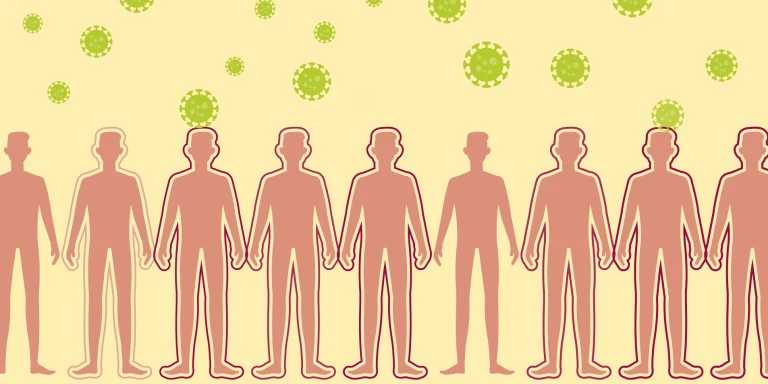
Whooping cough: time for a vaccine booster?
Even adolescents and adults can catch whooping cough. Does that mean that booster vaccines are helpful? We provide the information so you can make up your mind.
In Switzerland, around 7,000 people fall ill with whooping cough every year. This illness is caused by a highly contagious bacterium that spreads easily over distances of more than one metre via airborne droplets from sneezing, talking and coughing.
What are the symptoms of whooping cough?
Adolescents and adults with whooping cough usually suffer from flu-like symptoms such as a runny nose, weakness and occasionally a fever, as well as a cough that lasts for several weeks. The classic whooping cough symptoms suffered by children – coughing spasms with violent coughing fits at night – are very rare in this group. Nevertheless, infected adolescents and adults are contagious.
Complications among infants
Whooping cough is particularly dangerous for infants. This is because it can cause them to stop breathing, resulting in brain damage due to lack of oxygen, in pneumonia and, in extreme cases, in death by suffocation.
Booster vaccine: yes or no?
A combined booster vaccination helps adolescents and adults to protect not only themselves but also the very young. In Switzerland, a triple vaccination is available to protect against whooping cough, along with diphtheria and tetanus. But is it helpful to have a booster vaccination?
The Harding Centre for Risk Literacy at the University of Potsdam has summarised the potential benefits and adverse effects of the combined booster vaccination against whooping cough in adolescents and adults based on the available scientific studies.
Infection rate
Model calculations based on the studies show that between 50 and 80 out of every 100 young people and adults who have not had the combined booster injection can be expected to catch whooping cough if they come into contact with a carrier. By contrast, 3 to 10 out of 100 vaccinated adolescents and adults have been shown to contract the disease after being exposed to the pathogen.
Long-term cough
Without a combined booster vaccination, 40 to 80 people out of every 100 would suffer from a cough lasting at least three weeks. Among those vaccinated, this figure is only 2 to 10 people.
Possible side effects
The studies reveal that, as far as the temporary side effects caused by the vaccination are concerned, it makes no difference whether people receive a vaccination solely against tetanus and diphtheria or whether they receive the triple vaccination, which also protects against whooping cough. In both cases, between 5 and 30 out of every 100 adolescents and adults suffered from a high temperature. There was likewise no difference in the frequency of headaches and exhaustion. As with any vaccination, redness, soreness and swelling may be experienced at the injection site. There is no evidence of major complications following a combined vaccination.
The likelihood of actually coming into contact with the whooping cough pathogen is dependent on many factors, such as the number of people who have had the vaccination in the general population. The more people who are vaccinated, the less the pathogen can spread. Get vaccinated, and you’re protecting not only yourself, but also others, against infection. Ultimately, however, everyone needs to decide for themselves whether getting a booster vaccination is a good idea or not. We hope you now have a clearer overview of this complex issue.
Do you have any questions about about a diagnosis you have received? Or would you like to know about other health-related issues? Our health advisors provide you with helpful information and specific recommendations.
Health consultation service 058 340 15 69
Monday to Friday, 8.00 a.m. to 8.00 p.m. (local rate).
Helsana health consultation is a free service for everyone with Helsana supplementary insurance. By calling health consultation, you confirm that you accept the terms of use and the privacy policy.


Newsletter
Find out more about current health issues every month and get all the information you need about our attractive offers from all Helsana Group companies * delivered by e-mail to read whenever it suits you. Our newsletter is free of charge and you can sign up here:
We did not receive your information. Please try again later.
* The Helsana Group comprises Helsana Insurance Company Ltd, Helsana Supplementary Insurances Ltd and Helsana Accidents Ltd.